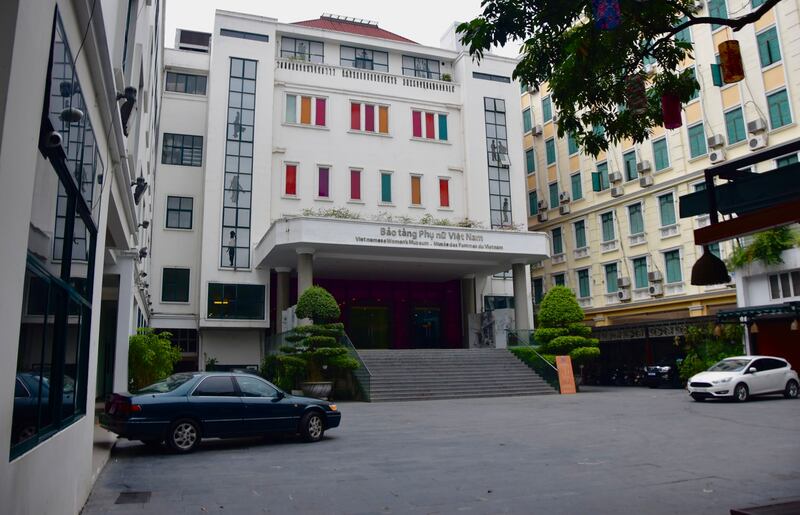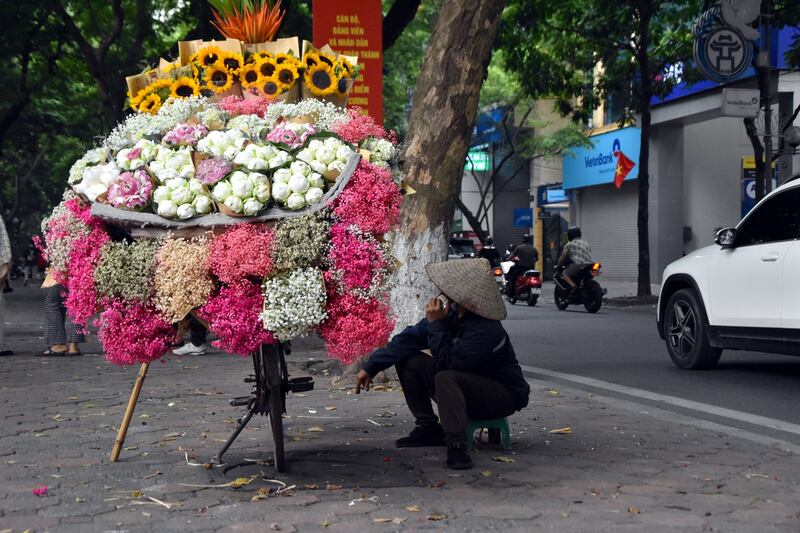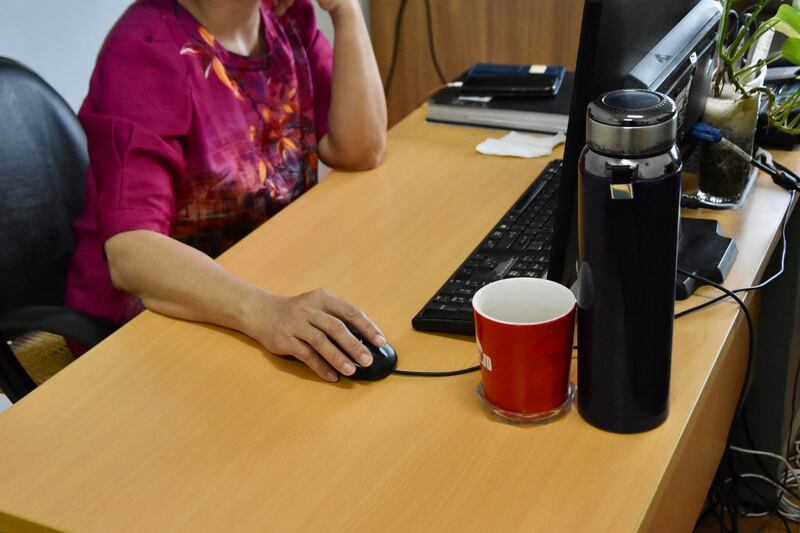This story contains depictions of violence against women and children.
As a social worker, Hoa has sat down with dozens of victims of domestic violence, but of all the stories she has heard, there is one that will always stand out.
“There was a woman who had been raped many times. Her whole family felt ashamed and believed that the only way to fix the situation was for her to marry her rapist,” Hoa told Radio Free Asia through a translator recently.
“After she was married, the man became even more violent. One time, she was seven months pregnant and he raped her so many times that she miscarried,” continued Hoa.
The violence went on for almost 20 years until one of her sons asked when she was going to put a stop to it. “That’s when she finally came to us for help,” Hoa said.
Hoa works at a women’s shelter in southern Vietnam. She asked that a nickname be used and her place of work concealed due to the sensitivity of domestic violence in the country.
Cases like the one Hoa worked on are not uncommon in Vietnam. But unlike in the past, when victims would often stay quiet, more women are starting to come forward.
Social workers, domestic violence survivors and researchers told RFA that a growing number of support services – from hotlines and shelters to social media groups – have created unprecedented spaces for Vietnamese women to share their stories and seek help.
“Women have suffered enough and now that they have these environments that let them speak out, they are finally coming out of the shadows,” said Hoa.

Indeed, Vietnam’s 2019 National Study on Violence Against Women found that nearly 63 percent of ever-married women had experienced some form of abuse in their lifetime – a five percent increase from an earlier study in 2010.
“This increase doesn’t necessarily mean there are more cases, only that more women are coming forward because they know there are now more readily available services for victims of domestic violence,” said Kanh Linh Nguyen, a social worker who runs the Peace House Shelter, Vietnam’s first shelter for victims of domestic violence and human trafficking.
”In my opinion, if there was another national survey conducted today, the number of reported cases would be even higher,” she added.
Perceptions of domestic violence in Vietnam are an indication of this. Data from the Organisation for Economic Cooperation and Development last year found that nearly 57 percent of women in Vietnam believe that a husband is justified in beating his partner under certain circumstances – the second highest rate in Southeast Asia after Timor Leste.
These perceptions are a reflection of the social norms, legal restrictions, and accessibility hurdles that continue to handicap Vietnamese women and in particular, victims of domestic violence.
While these challenges will take time to overcome, change is already underway.
Gradual shift
Peace House Shelter, established in 2007, is one of the places at the forefront of helping to make this change. The shelter offers a hotline, counseling services, legal support, health care, and vocational training at locations in Hanoi, the capital, and in Can Tho, a city in the southern Mekong Delta region.
The shelter operates under the Center for Women and Development, or CWD, one of Vietnam’s leading organizations supporting victims of domestic violence, and which is under the auspices of the government-run Vietnam Women’s Union. Even with government backing, however, the shelter was initially met with resistance.
Linh said that when the shelter first opened, it was difficult to work with local governments to bring support to victims because domestic violence had always been “something you should keep behind closed doors and deal with inside the home.”

Eight months after the Peace House Shelter was founded, the government passed the country’s first Law on Domestic Prevention and Control. It offered a broad definition of domestic violence, including psychological and economic abuse, and outlined prevention and protection mechanisms. It was amended in 2022 to strengthen responses and give more resources to support facilities.
But even after the law was first passed, it took until the 2019 COVID-19 pandemic for a wider range of support services to become available.
“During COVID-19 a lot of people went through financial hardship and when people are not economically stable, there is often an increase in domestic violence,” Linh said, adding that the Peace House Shelter experienced a 300 percent increase in women calling in to report violence during this time.
Mushrooming services
In response, the Ministry of Labour, Invalids and Social Affairs opened Vietnam’s first One Stop Service Center, or OSSC, in the northeastern province of Quang Ninh in 2020 to support those facing domestic and gender-based violence.
Two years later, three more OSSCs opened in the northern city of Thanh Hoa under the ministry, and in central Da Nang and southern Ho Chi Minh City under the Centre for Studies and Applied Sciences in Gender – Family – Women and Adolescents, a non-governmental organization. Even the Vietnam Farmers Union, a socio-political organization that supports farmers, launched its own hotline in 2021 to help women living in rural areas.
Along with these formal services, numerous groups on the social media platform Facebook were also formed, where victims share their stories and seek support from others who have gone through similar experiences.

No one has noticed this trend to more openness of reporting than those working on the frontlines.
“I have been working for the Peace House Shelter hotline for 17 years, before the first law on domestic violence was passed, and since then, I have seen a positive change in the willingness of women to speak out,” said Bich, an older, soft-spoken woman who spoke to RFA from the call center in August.
Despite its reach, the hotline is run out of a simple room with four desks and a small seating area at the CWD’s main office in Hanoi. When RFA visited, Bich was manning the phones alongside only one other colleague. Both were reluctant to be away from their desks for long in case a call came in.
Younger women have been particularly more willing to speak. Hoa said that around 80 percent of those who reached out to the shelter where she worked were between the ages of 22 and 40.
“Young people nowadays have more awareness about this issue, while women in my parents’ or grandparents’ generation were taught to simply endure the inequality and violence,” said Khanh Linh Nguyen (who is not related to Nguyen of Peace House), a project manager at the HopeBox, Vietnam’s first social enterprise to support survivors of gender-based violence.
Uyen and her cousin Phuong are part of this new wave of victims choosing to speak out.
A high school student from Vietnam’s central Nghe An province, Uyen spoke to RFA alongside her cousin, Phuong, through a translator. Both girls are 17 and asked that only their first names be used out of fear of retribution from their parents. Both described having faced violence at home; both asked for help.
When a victim first contacts a center like the Peace House Shelter, she will undergo a consultation and screening to determine the severity of their circumstances and what kind of services would be best to support them, explained Hoa, who is familiar with the model.
If she is in danger, and if she is willing, the victim can then be brought into the shelter where she can meet with a lawyer for legal advice should she want to press charges and see a doctor who can administer medical care and collect evidence of her injuries.
‘Your own business’
Vietnam is far from the only country that has struggled with domestic violence, but its culture and history have made advancements slow-moving.
Social beliefs that tend to devalue women’s places in society have contributed to making domestic violence seem acceptable in the past, according to Nguyen of HopeBox. And these may well have been reinforced by Vietnam’s education system that, until recently, was void of any mention of women’s rights, within the home or elsewhere.
“Compared to Western countries that have been learning about human rights and women’s rights for a long time, Vietnam is behind. We have started to educate on this, but we still need more time to catch up,” said Hoa.
While Vietnam is in the midst of a shift with women seeking support services, advancements have been slower when it comes to reporting violence to authorities.
The 2019 national study found that 90 percent of women who had experienced domestic violence had never sought help from the police. While this number has likely decreased since, according to experts, it is still high.
Many victims do not think the violence is serious enough to report. Others avoid the police so as not to bring shame on themselves or their families, and some stay quiet out of fear of retribution, as Uyen previously did.
“I have nowhere else to go and I was scared that if I called the police, my parents would kick me out,” she said.
Phuong did try reporting once but was quickly deterred from ever trying again.
“I called the police and told them that my father beat me for no reason, but they refused to accept the case,” said Phuong. “They said ‘it’s your fault that your parents beat you, don’t ever call us again, this is your own business’.”
People have a tendency to “make excuses for the perpetrator and say that it’s because he got angry or he was going through a difficult time,” noted Linh, of Peace House Shelter, and this can also make victims less likely to report the violence in an official capacity.
Another problem is that most police officers in Vietnam are men and often, victims are reluctant to talk about such sensitive issues with male officers, according to Dr Phan Thi Lan Huong of Hanoi Law University.
And despite passing a law to define the problem and provide resources, Vietnam’s criminal code does not cover domestic violence, only general acts of violence. It stipulates that, with the exception of certain circumstances, violence is only a criminal offense if the victim suffers injuries that cause more than 11 percent “physical disability”.
Burden of proof; burden of leaving
While there needs to be a way to measure the severity of a crime under the law, in the case of domestic violence, where the injuries are not always physical or visible, the current penal code often leaves victims fending for themselves said Huong.
“The system requires a burden of proof and in so many cases the victims don’t have enough evidence,” Huong added.
Beyond fear of the authorities and restrictions within the criminal code, obstacles also remain in terms of access. For Uyen, in Nghe An province, she had not heard about shelters for adult victims of domestic violence until recently.
“For most of my life, I thought that the helplines were only for small children,” she explained.
The Peace House Shelter and the OSSCs are largely restricted to the areas in which they operate, which currently only cover six cities in the country. RFA’s attempts to visit the OSSCs and the Vietnam Farmer’s hotline were rejected, with staff explaining the issue was overly sensitive and government permission was required.
CWD has partnerships with local welfare centers in rural areas and its parent agency, the Vietnam Women’s Union, has a network of “reliable addresses” where women can go in case of emergency, but these offer only temporary respite.
For longer-term solutions, survivors need to go to one of the two Peace House Shelters, which is not always possible.
Linh from Hopebox explained that many women feel a responsibility to stay close to home, even if it means enduring the violence.
“I have met several women who, even though they are survivors and really want to leave their environment, cannot because of their children,” she said. She added that it’s also often costly for them to bring their children with them, especially to Hanoi where school tuition fees can be much higher than in rural areas.
“Maybe one day the government will have more benefits or policies for women who want to escape these environments but right now we don’t have any.”
But those who work on domestic violence are hopeful. They acknowledge that it will take time, but for now Vietnam is on the right track.
“Most victims are trapped in cycles of abuse. If they do not share their pain or speak out about their problems, no one can know what they are going through and offer them help. When a victim speaks up, it is like they are opening the door to their home, allowing others to step in and offer help,” said Hoa.
This was what happened with the rape survivor Hoa supported last year. When she first came in, explained Hoa, she was not sure what to expect. But after speaking about the violence she had faced she was able to get help and move on.
“Now, she is divorced and lives happily with her son,” said Hoa.
Edited by Abby Seiff and Boer Deng.
If you or someone you know is facing domestic violence, call 1-800-799-7233 or text 88788 to reach the National Domestic Violence hotline or go to thehotline.org for additional resources.
In Vietnam, call 1900969680 to reach the Peace House Shelter’s toll-free hotline in Hanoi or call 02433335599 to reach the One Stop Service Centers’ toll-free hotline in Ho Chi Minh City and Da Nang.
